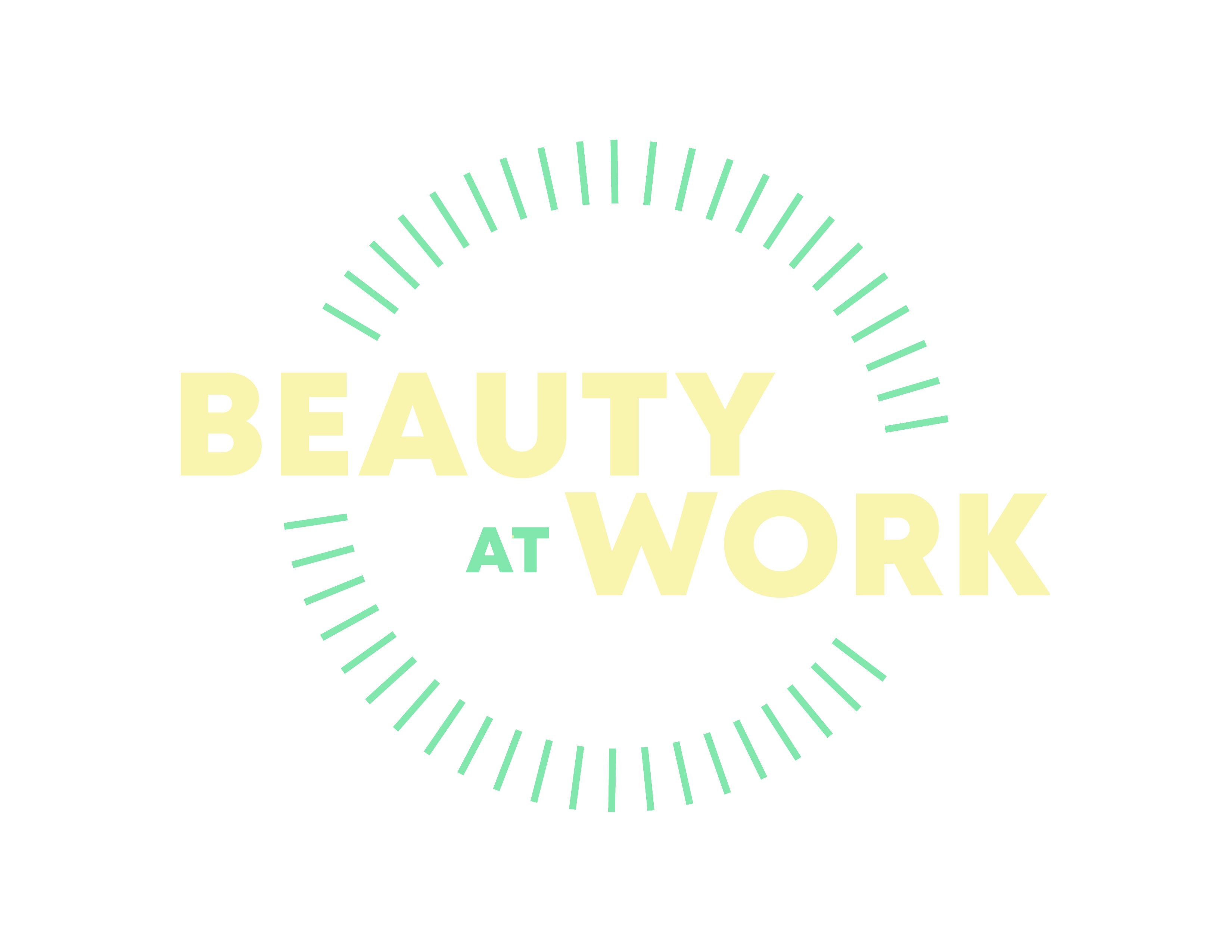The Year in Review

It's hard to believe we're at the end of 2023. Looking back over this past year, I'm filled with gratitude for all the wonderful people I've had a chance to speak to and learn from through the podcast, videos, and events we've organized through the Beauty at Work platform.
I'm honestly amazed that we're still going strong. This was a passion project I started last year on a lark, just to explore my hunch that the concept of beauty could be a generative lens through which to approach work.
The title "Beauty at Work" is still something I'm feeling unsure about. But it does capture the two big questions I'm interested in understanding: 1. How does beauty work--how does it affect us and why does it matter for our lives? and 2. How can we find or cultivate beauty in the work we do? I sent out a poll a few weeks ago to gauge what subscribers thought about possibly rebranding it, and the overall verdict, for now anyway, is just to stick to Beauty at Work.
Below is a review of the podcast episodes, videos, and events from this year, and some of the things we've got lined up for the year ahead. Here's your chance to catch up if you've missed anything. If you found any of these especially interesting or helpful, do drop me a line to let me know why. And I'd also love to hear from you about topics or guests you'd like to see next year, and any other ideas for events, activities, or any other way in which I could provide something you would find helpful.
Podcast Episodes
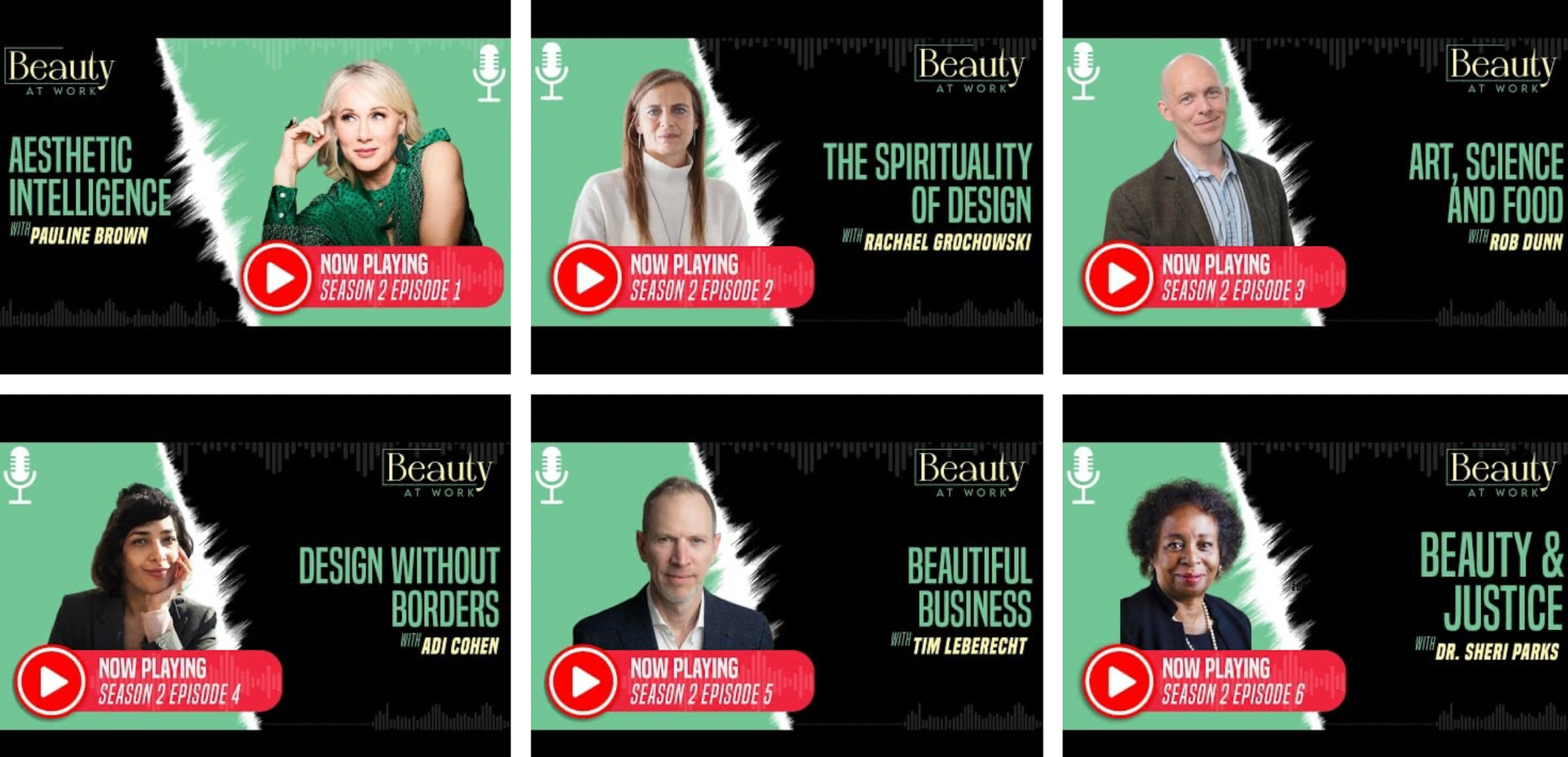
Click on the episode titles below to access the audio, video, and transcripts for each episode.
S1E7: Beauty, Desire, and Rivalry in Science and Technology. Entrepreneur and author Luke Burgis argues that there’s more to beauty than the things we desire. Most of our superficial desires are mimetic, borrowed from others. But there are things we find beautiful that are deeply satisfying and enduring, that don’t simply reflect borrowed desires. Beauty, he argues, is a perennial human need.
S1E8: The Science of Awe and the Awe of Science. Psychologist Dr. Dacher Keltner distinguishes beauty from awe, which is closer to the sense of the sublime. But a key source of awe is moral beauty, exhibited in the virtuous character and actions of others. We discuss both the science of awe and how awe can fuel scientific inquiry.
S1E9: Why Aesthetics is Essential for Science Education. Dr. Punya Mishra argues that teaching math and science requires engaging our emotional and aesthetic sensibilities. We need to create a sense of anticipation, raising questions in students’ minds for which they hunger for answers. There’s also beauty in elegant coding, which can be intrinsically rewarding.
S1E10: Finding Beauty in the Limits of Science. Physicist and author Dr. Marcelo Gleiser talks about the beauty to be found in the never-ending scientific quest. Science is our bridge to something much bigger than we are out there; it is a way of connecting with the deep mystery of existence. He emphasizes the beauty of science as a spiritual pursuit.
S1E11: The Beauty of Applied Science. Epidemiologist Dr. Marcia Otto talks about beauty in applied science. She finds beauty in discovering new ways in which the fruits of scientific knowledge can help solve real-world problems and contribute to our flourishing, and also in opening up new surprises and possibilities. She also talks about the beauty of teaching, when you see a student’s passion for science emerge.
S1E12. Wonder: Cultivating the Love of Science. Psychologist Dr. Frank C. Keil emphasizes that wonder is more than awe or curiosity; it's an active quest for understanding underlying mechanisms, asking questions like "why" and "how." Keil highlights the importance of nurturing wonder through open-ended questioning and shared inquiry. He encourages embracing intellectual humility and maintaining a sense of wonder through active questioning and exploration in our work.
S1E13. Can Viruses be Beautiful? Immunologist Dr. Mark Painter distinguishes between the aesthetic appeal of scientific images and the deeper beauty of understanding complex scientific phenomena. He emphasizes the importance of open communication between scientists and the public to build trust, particularly in light of the pandemic. The interview underscores how scientific discovery, despite its challenges, offers a unique experience of beauty through the understanding of intricate systems and processes in nature.
S1E14. What's Beautiful About Mathematics? Mathematician Dr. Carlo Lancellotti highlights the aesthetic appeal of mathematics, which often lies in discovering unexpected connections and the universality of certain principles. He discusses how the simplicity and elegance of mathematical formulas, despite their complexity, reveal the inner workings of the universe. The interview underscores the idea that beauty is found in understanding deeper truths and patterns in nature.
S1E15. Science, Art, and the Sacred. Iconographer David Clayton discusses the fusion of science and art in his creative process. His scientific background, grounded in materials science and metallurgical engineering, helps him identify the role of scientific intuition and mathematics in understanding and creating art. He explores how scientific discoveries mirror patterns in sacred art and architecture, highlighting the interconnectedness of science and art in the pursuit of beauty and truth.
S1E16. How Beauty Leads Science Astray. Physicist and author Dr. Sabine Hossenfelder discusses how the pursuit of beauty in scientific theories, particularly in theoretical physics, can be misleading. She argues that aesthetic criteria in scientific theories aren't necessary for mathematical consistency and can lead scientists astray. She emphasizes the need for scientific theories to be testable and grounded in reality. This reflection is vital for professionals in any discipline, as it underscores the importance of basing decisions and judgments on objective criteria and evidence, and cautions us about how beauty can be a source of bias.
S2E1. Aesthetic Intelligence. Pauline Brown, a marketing professor at Columbia Business School and former senior executive in the luxury goods sector, introduces the concept of "aesthetic intelligence." Brown defines aesthetic intelligence as the ability to understand and harness the power of sensory experiences to generate emotional responses and, subsequently, value. She emphasizes that aesthetic intelligence is not just taste; it requires discrimination, self-awareness, sensorial attunement, and the ability to articulate visions effectively. She also discusses how aesthetic intelligence can be a competitive advantage in business, especially in the age of AI, and how it can be nurtured and developed.
S2E2. The Spirituality of Design. Rachael H. Grochowski, an award-winning architect and designer, explores the relationship between beauty, design, and spirituality. Grochowski infuses principles of yoga into her designs, creating spaces that foster calmness, interconnectedness, and gratitude. She emphasizes that design is more than just creating aesthetically pleasing structures; it's about creating experiences that connect us with nature and ground us. Grochowski views beauty as found in contrasts and transitions, akin to the shifts experienced in yoga. This philosophy underlines her belief that design is deeply spiritual, transcending mere aesthetics to create environments that resonate with our inner selves and collective history.
S2E3. Art, Science, and Food. Dr. Rob Dunn, an ecologist and evolutionary biologist, discusses the intersection of art, science, and gastronomy. Dunn emphasizes the concept of elegance in science, where simple concepts explain complex phenomena, and acknowledges the sublime beauty in the natural world that can be observed both in the field and laboratory settings. His work involves collaborations with artists to engage the public in scientific concepts. Dunn believes in the potential of these interdisciplinary collaborations to address complex issues and envisions a future where artists and scientists work together to bring humanity into scientific narratives and confront societal challenges.
S2E4. Design Without Borders. Adi Cohen shares her journey as a nomadic architect. Her approach to architecture is rooted in her global experiences, integrating local and universal aesthetics to create spaces that resonate with patterns that we are universally drawn to. Cohen's method involves envisioning the emotional impact of a space before its design, focusing on the human aspect in architecture. Her practice reflects her nomadic lifestyle, emphasizing flexibility, creativity, and cultural sensitivity in architectural projects worldwide.
S2E5. Can Business Be Beautiful? Tim Leberecht, a German-American author and entrepreneur, discusses how business can transcend mere efficiency and profit to embrace beauty and humanism. Leberecht's work, including his book "The Business Romantic" and the co-founding of the House of Beautiful Business, seeks to infuse business with meaning, beauty, and sublimity, challenging the dominant rationalist model. This approach underscores the importance of emotional and spiritual dimensions in business, aiming to create a more life-centered economy that honors human diversity and creativity.
S2E6. Beauty and Justice. Dr. Sheri Parks explores the intersection of art, aesthetics, and social justice. Her work sheds light on the importance of everyday aesthetics. She discusses initiatives that integrate art and justice, involving projects where young people collaborate with artists to reimagine their communities, emphasizing dignity and healing through artistic endeavors like dance and the Indigo Dye Initiative.
S2E7. The Beauty of Teaching Science. Biologist Dr. Dave Gammon discusses the beauty of teaching, focusing on a holistic approach which emphasizes integration across disciplines. He highlights the importance of connecting science with arts and humanities to foster a comprehensive understanding of the world. Gammon shares insights from his course "Journey Through Time," which offers a broad look at scientific phenomena from the Big Bang to modern civilization. The episode explores the beauty of interdisciplinary teaching and its impact on developing a deeper, more connected view of science and the universe.
S2E8. Beauty and Design. Award-winning architect Pallavi Dean discusses her approach to design, emphasizing the importance of embracing imperfection and the transient nature of things. Dean's design firm in Dubai creates spaces that captivate all five senses, offering deeply engaging experiences that evoke lasting memories and resonate with empathy and human connection. Her work is characterized by a deep respect for the unique context of each site and project, whether in Dubai or globally.
S2E9. From High Notes to High Planks. Renowned fitness instructor Sean Vigue narrates his journey from musical theater to coaching yoga and Pilates. Initially motivated by aesthetics in fitness, Vigue's journey illustrates the transition from seeking external beauty to finding deeper, more holistic beauty in movement and teaching. His workouts, characterized by attention to the fundamentals of conditioning, emphasize feeling beautiful and capable, rather than merely looking good. Vigue's approach to fitness challenges the conventional focus on aesthetic perfection, highlighting the elegance of motion and the joy of connecting with one's body.
S2E10. Fragile and Flourishing Neighborhoods. Seth Kaplan, an expert on fragile states and political transitions, argues that solving our most pressing social problems requires us to build thriving and beautiful neighborhoods. Kaplan findsthat societal well-being and flourishing are deeply connected to the strength of neighborhoods, which are crucial for the collective vitality of institutions. He discusses how to transition neighborhoods from fragile to flourishing, highlighting the importance of strong community bonds and local institutions in creating a beautiful society.
S2E11. Beautiful Leadership. Esther Blázquez Blanco discusses leadership in the context of building human-centric work cultures. She challenges the traditional, bureaucratic model of leadership, advocating for a leadership style rooted in genuine connection and emotional intimacy. Esther's approach emphasizes understanding individuals beyond their roles and metrics, fostering environments where vulnerability and collaboration are valued. She argues that acknowledging and working through imperfections and weaknesses is crucial for cultivating a beautiful, effective culture. Her insights offer a roadmap for leaders to create more engaging, fulfilling, and innovative workspaces.
S2E12. The Transformative Power of Beauty. Chris Everett, with a diverse background as a musician, designer, farmer, and arts non-profit co-founder, has embraced the concept of beauty as more than an external aesthetic. He views beauty as a "shy peek at divinity," influencing not just our perception but also our connection to and search for meaning in the world. Chris has come to embody the role of a "minister of beauty," creating transformative spaces and experiences that extend beyond superficiality, fostering personal and communal healing and growth.
S2E13. Crafting Fashion Excellence. Ean Williams, Founder and CEO of DC Fashion Week, discusses the intersection of beauty and fashion. He explores how fashion not only reflects personal style but also has the power to influence perceptions and command respect. Ean delves into the challenges of the fashion world, particularly in modeling and design, and shares his vision for DC Fashion Week as a platform celebrating diverse beauty and design from around the globe. His insights reveal the multifaceted role of beauty in fashion, from personal expression to shaping cultural narratives.
S2E14. The Beauty of Nature. Entrepreneur, author, and speaker Jennifer Walsh discusses the beauty of biophilia. She explores the importance of integrating natural elements into our living and working spaces, not just for aesthetic appeal, but for the nurturing of the soul. Her journey from finance to the beauty industry, and her personal experiences, particularly influenced by her sister with special needs, have deeply shaped her understanding of nature's beauty. Jennifer's work, supported by insights from neuroscience, advocates for reconnecting with nature to enhance well-being, especially in urban settings where nature is often overlooked.
Join the Community
Bonus episodes
My smart and funny wife Claire and I have started recording a series of bonus episodes that we're calling Making Beauty Work, in which we comment on the regular podcast episodes. This is currently in beta mode and is available only to subscribers on video. We'd love to know what you think and if we should continue to make these.
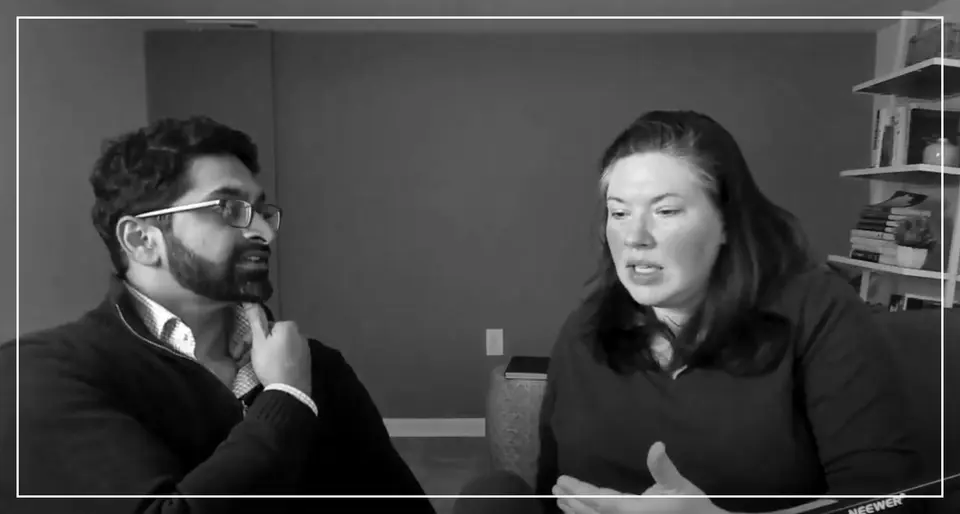
Videos
You can also watch short clips (less than 60 seconds each) from our podcast episodes on YouTube or Instagram.
In addition to the podcast, we also made a few videos on beauty in other fields:
Events
We organized three main events last year: an international symposium, a retreat, and a series of salon dinners in different cities.
The International Symposium on Beauty at Work in Washington DC brought together academics and practitioners from a wide variety of fields to discuss what beauty means, how it works, and why it is relevant in different domains of work. You can find a summary of the event as well as videos of the plenary sessions below.
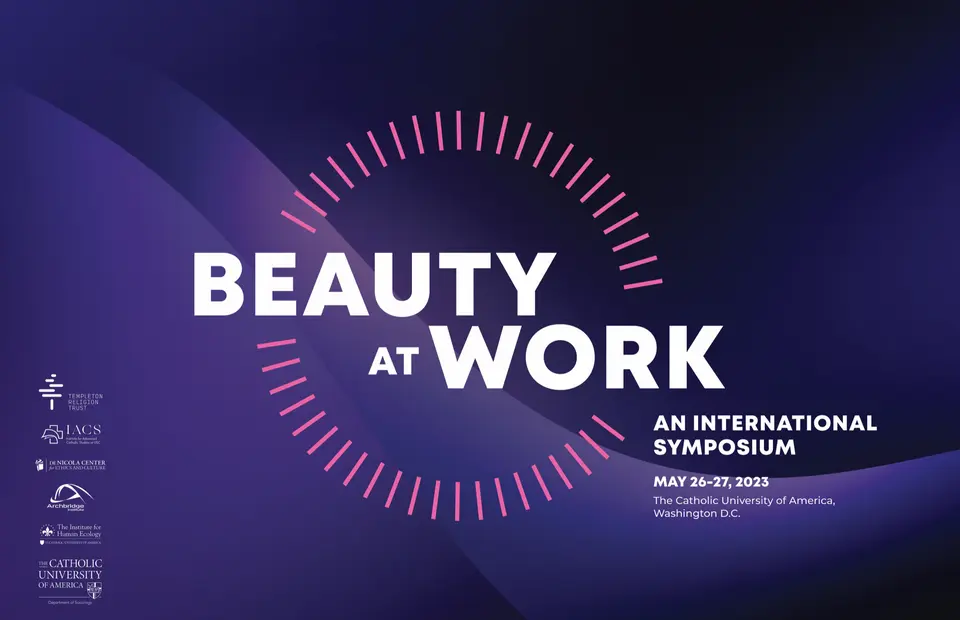
You can also watch a short video here summarizing the motivations and goal of this event.
We also organized our first Retreat on Beauty at Work, which brought together a small group of professionals from diverse professional and spiritual backgrounds for a three-day retreat which included opportunities for silence, time spent in nature, group discussions, an art workshop, and a musical performance. You can read more about the event here:
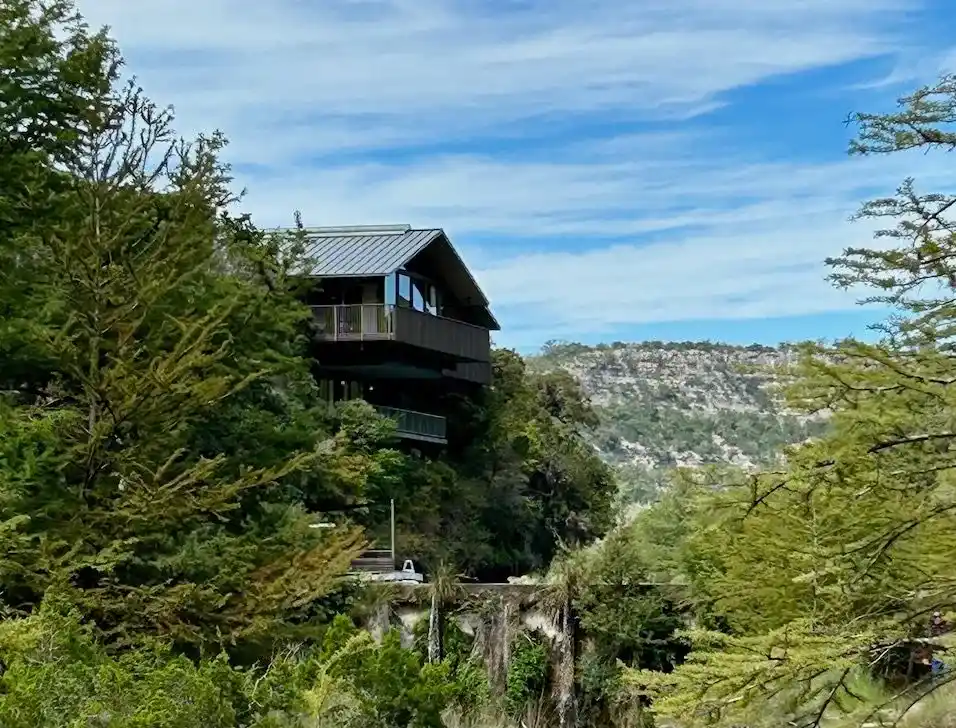
Finally, we held 3-hour salon dinners bringing together small groups of professionals and leaders in different cities: Houston TX; New York City; Rome, Italy; Toronto, Canada; Durham, NC; Salt Lake City, UT; and Dubai, UAE.
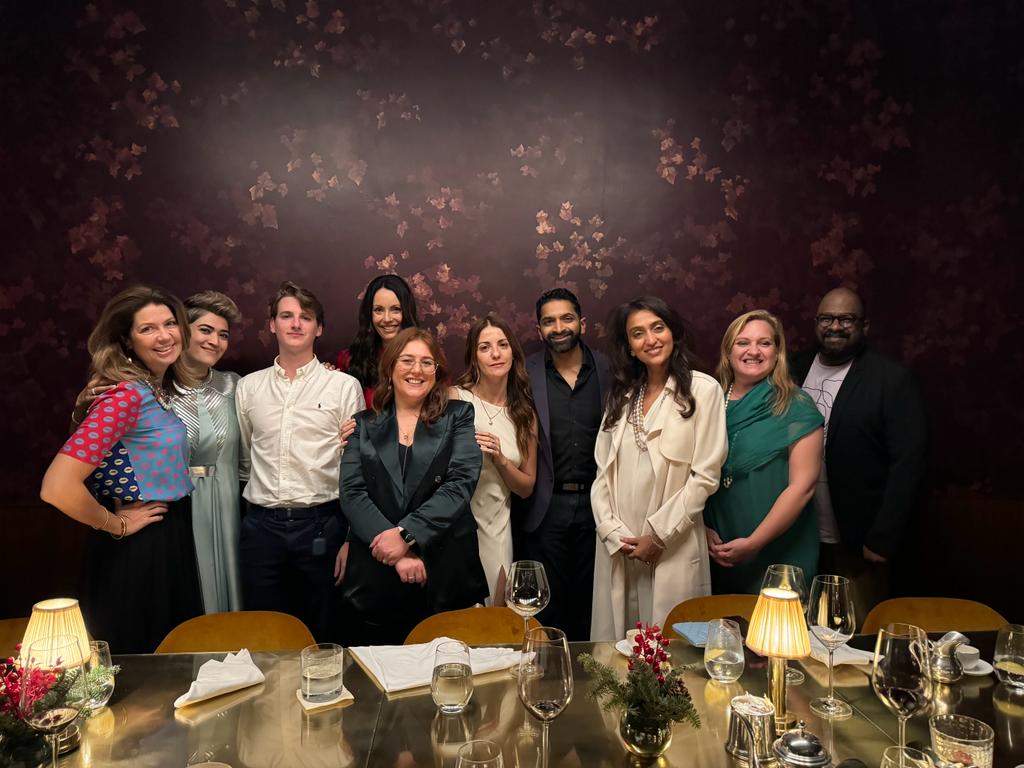
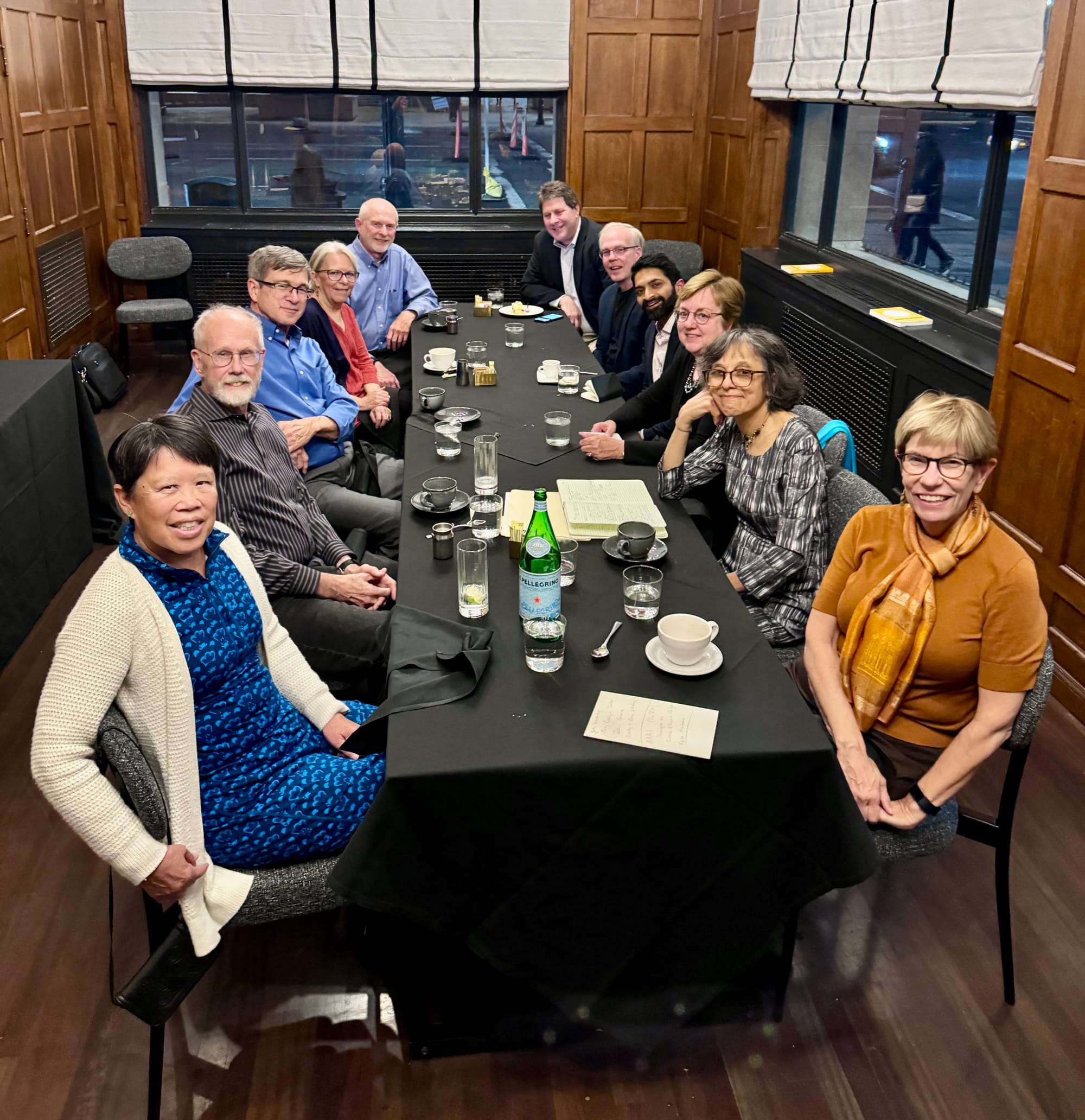
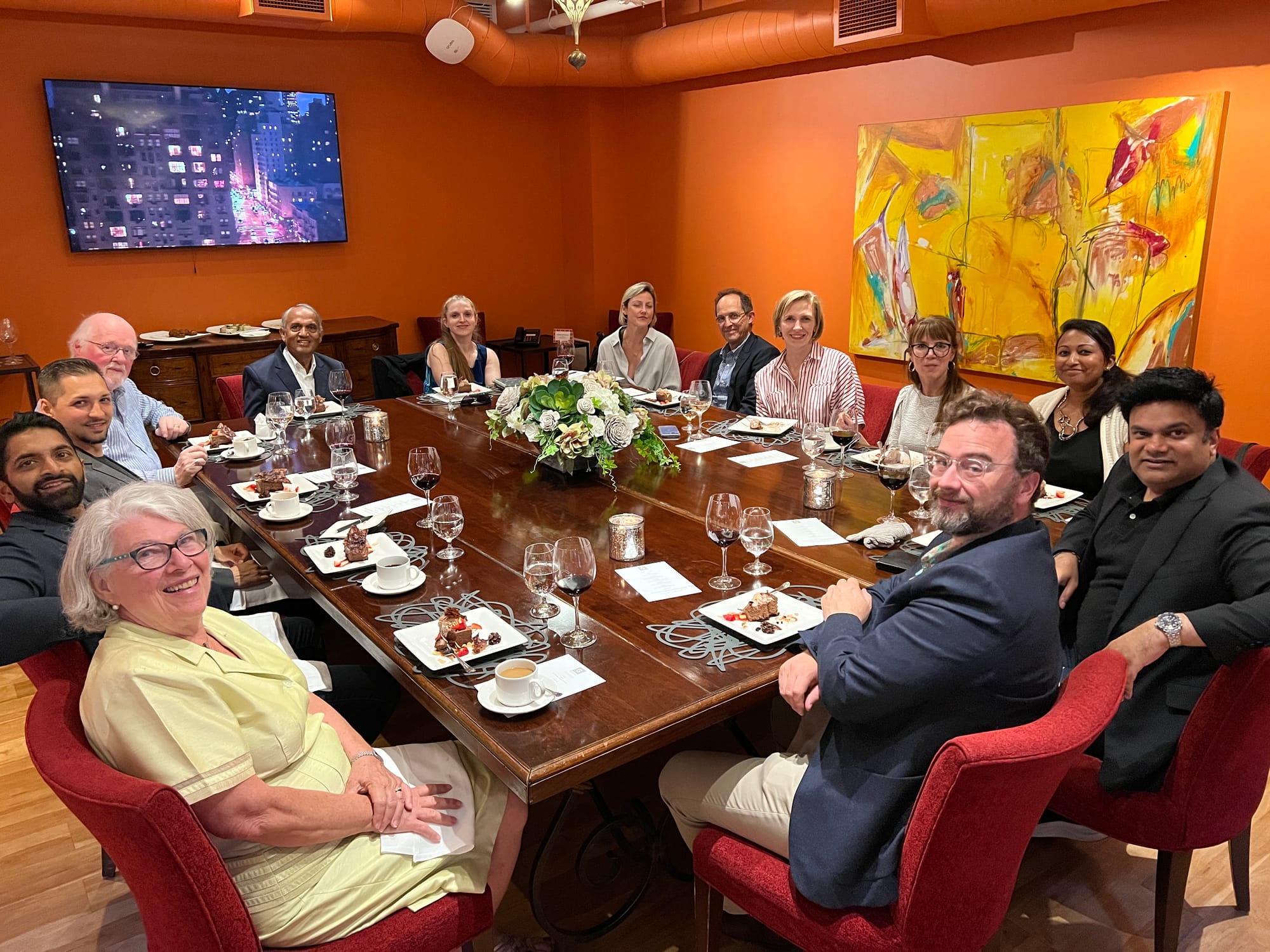
Photos from some of our Beauty at Work salon dinners
What's Ahead
I've been trying to develop ways to make this platform, and the knowledge I've been gaining from the podcast and events, more practically helpful to people. One of the first results of this will be a workbook to help you develop a more beautiful work life. This will be releasing very soon (hopefully before the year ends).
We're going to start the new year with a brilliant (and long-overdue) episode with philosopher Dr. Michael Spicher on what beauty means – and we have a few more episodes lined up before we conclude Season 2.
We're also going to continue salon dinners, with events planned in New York, London, and Los Angeles – and hopefully more.
We're also likely going to be able to sponsor two Beauty at Work retreats for scientists, one in the US and the other in either the UK or elsewhere in Europe.
I've been coming across more and more people who have been animated by the concept of beauty and are seeing it as vital to the future of work. I'm hoping to create some sort of community or network to bring folks together who may think they're the only ones on this journey.
I'm also on the lookout for collaborators and sponsors for our various events and activities. We've had a lot of interest in a follow-up symposium, for instance. If you are interested in collaborating or sponsoring either this event or any of our other activities, please let me know.
A Note of Thanks
All this work wouldn't be possible without the help and support of many people.
I'm deeply grateful to Templeton Religion Trust, Archbridge Institute, and the Institute for Advanced Catholic Studies at the University of Southern California for financially supporting our events and activities in various ways.
I'm also thankful to Dave Visaya at Podcast Engineers who edits the podcast; to Will Tishuk and Emily Capps for their help with video editing and scheduling posts; to Ginamarie Lynch, Angela (Mayerle) Buckley, and our student team who helped us pull off a successful symposium; to Claire Vaidyanathan for her support and her willingness to respond to my regular requests for feedback on various things; and to our kids for putting up with this incredibly consuming hobby. And many thanks to all of you subscribers, listeners, readers, viewers, and event participants for your encouragement and support.
I hope I can continue to build this thing, whatever this is turning out to be, into something that can be valuable and beautiful for you all.
Wishing you all happy holidays and a happy new year,
Brandon
